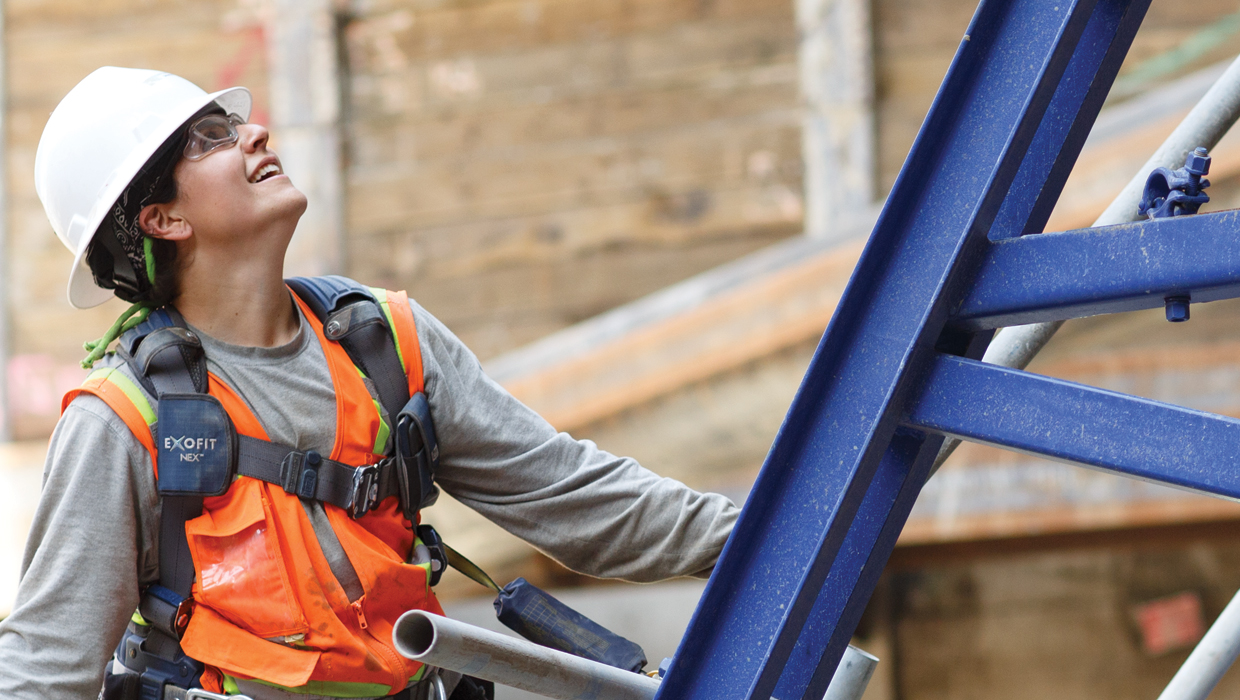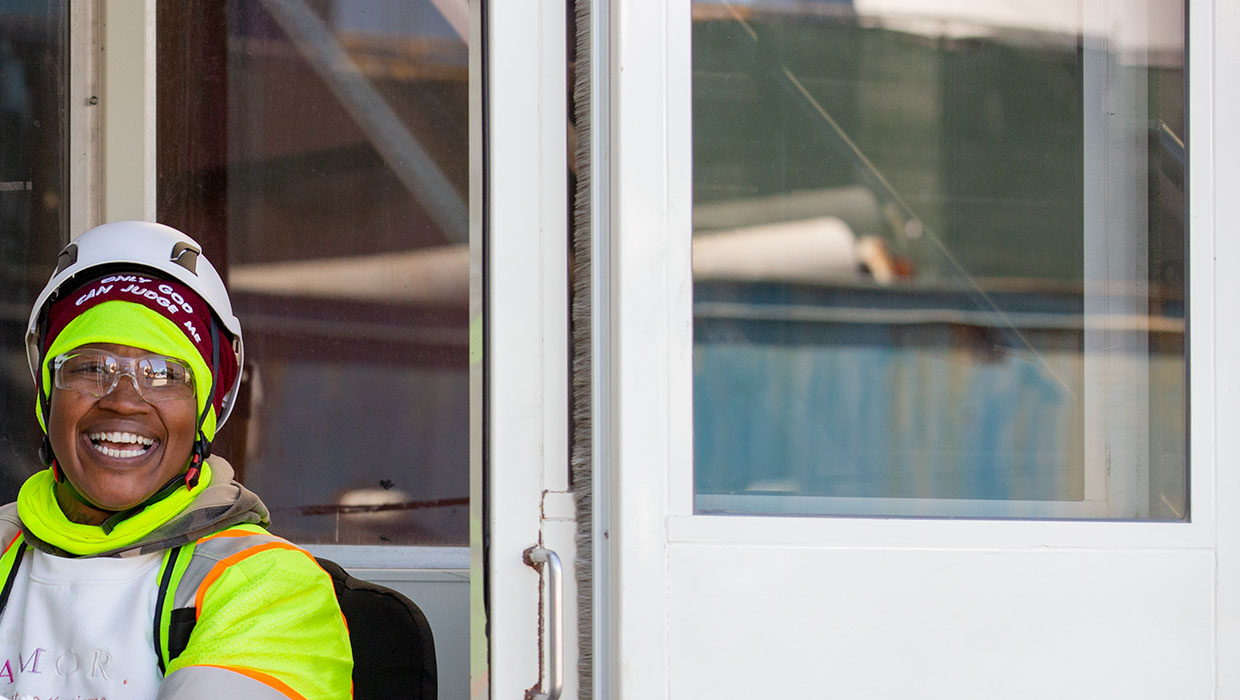Boilermakers
As a boilermaker, you will assemble, install, maintain and repair boilers, closed vats and other large vessels or containers that hold liquids and gases used to generate electric power or provide heat. Skills needed for this trade include reading blueprints, rigging heavy loads – and often working in places that are more than 100 feet high.
Bricklayers, Tilesetters and Allied Craftworkers (BAC)
If you want to work with brick, tile or marble, there are a number of trades you can choose from. Bricklayers build walls, chimneys and other structures using brick, block, glass block or stone. Tile layers install tile and stone of various shapes and sizes on showers, tubs, countertops, walls, floors and more. Tile finishers help the tile layers by prepping the area where the work will be performed. Marble finishers polish and fabricate stone edges, while terrazzo workers and finishers work together to create artistic floor designs.
Carpenters
As a carpenter, you will be needed in all areas of construction, as you are responsible for bringing a site’s blueprints to life. You’ll provide the crucial foundation for concrete, exteriors, roofs, infrastructure and scaffolding while crafting fine trim and finish work. As you work, you will adhere to local building safety codes and guidelines.
Cement Masons/Plasterers – Operative Plasters' and Cement Masons' International Association (OPCIA)
If you choose to become a cement mason, you’ll be able to perform all phases of cement finishing, including preparation, demolition, concrete sawing, and stamped and stained concrete. As a plasterer, you’ll be able to apply plaster to interior and exterior walls, ceilings and other surfaces.
Construction Teamsters
As a construction teamster, you will be qualified to drive a wide variety of construction equipment, including tractor trailers, mixer trucks, flatbeds or lowboy trailers, dump trucks, fuel trucks, water trucks, road repair equipment and job-site crew buses.
Electricians
In your role as an electrician on a building site, you will specialize in the installation, wiring and assembling of electrical systems. You will install a building’s electrical system for air conditioning, power and heat – and set up transformers, circuit breakers and fuse boxes while following state and local wiring regulations.
Elevator Constructors
In your role as an elevator constructor, you will be responsible for assembling, installing, repairing and replacing elevators, escalators, chairlifts, moving walkways and similar equipment. As a routine part of the job, you may work in cramped areas inside crawl spaces and machine rooms, and you may also work at heights in elevator shafts.
Finish Trades – The International Union of Painters and Allied Trades (IUPAT)
Finish trades involve the finishing of surfaces in a building – and you’ll find a wide variety of finish trades to choose from. If you decide to pursue painting as a trade, you’ll specialize in the application of paint, varnishes, lacquers, sealers, stains and wallpaper. As a drywall finisher, you’ll finish wallboard to a uniform surface for painting or wall covering. As a glazier, you’ll install glass, glazing systems and architectural metals. If you choose to become a trade show installer, you’ll set up and dismantle exhibits, install specialty lighting and graphics, and more. If you pursue the floor covering trade, you’ll be able to measure, fit and install carpets, sheet rubber, linoleum, tile, laminate floors, artificial turf and more.
Heat and Frost Insulators
If you choose to become a heat and frost insulator, you will learn to apply insulation materials to plumbing, air handling, heating, cooling and refrigeration systems. You’ll also be able to insulate piping equipment and walls, floors and ceilings of buildings to prevent or reduce the passage of heat, cold, sound or fire.
Ironworkers (Field)
In your role as an ironworker, you will be responsible for installing structural and reinforcing iron and steel to form and support buildings, bridges, tunnels and roads. The work can be physically demanding and dangerous, as it often includes rigging heavy equipment and welding while at great heights.
Laborers
As a laborer on a construction site, you will perform a wide variety of construction-related activities during all phases of construction. These might include pouring concrete, paving roads with asphalt, working on demolition projects or cleaning the site with tools such as a shovel or a broom.
Operating Engineers
As an operating engineer, you will be responsible for repairs and upgrades to heavy construction equipment (such as cranes and concrete pumping, pile driving and drilling equipment). You can expect to routinely examine machinery for defects and communicate maintenance schedules to department heads.
Pipe Trades – The United Association of Journeymen and Apprentices of the Plumbing and Pipefitting Industry (UA)
When you enter into the pipe trades, you can choose from a number of different roles. For example, as a steamfitter (or pipefitter), you’ll be able to install any piping systems needed on new construction. If you choose to focus on steam refrigeration and air conditioning, you’ll be responsible for installing, testing and repairing refrigeration and air conditioning systems. As a sprinkler fitter, you’ll install the hangers and overhead piping needed for fire protection systems by following blueprints provided. Finally, if you choose to become a plumber, you’ll play an essential role in public health and safety through the installation and repair of pipe systems that carry water, waste drainage, and natural and medical gas in buildings.
Roofers and Waterproofers
As a roofer and waterproofer, you will work on many types of buildings to protect them from water intrusion and damage to the structure using a combination of materials that could include asphalt shingles, tile and single-ply roofing materials such as PVC and modified bitumen. Waterproofing can also be done below grade on a structure’s foundation.
Sheet Metal Workers
In your role as a sheet metal worker, you will fabricate, install and repair metal structures, such as ductwork, roofing and siding. Your primary work will involve shaping and joining metal pieces into a finished product for heating, ventilating and air conditioning structures.
Apprentice Readiness Training
Your first step along the construction industry career path is an 8 to 12 week Apprenticeship Readiness training program. This is designed to prepare you to enter and succeed in a registered apprenticeship program.
Some programs offer cash assistance.
Apprentice
As an apprentice, you will learn your chosen trade through paid, on-the-job training (80%) and classroom training (20%). The more you learn, the more skills you gain and the more you can earn. An apprenticeship usually lasts anywhere from three to five years.
Pay range: $17.85 to $57.96/hour*
*Pay range rates are based on range of various apprentice craft levels.
Journeywoman
You become a journeywoman when you have gained the skills to successfully complete your apprenticeship. Journeywoman are the workers with the most knowledge of a craft. They will ultimately help develop the next generation of apprentices.
Pay range: $17.50 to $67.80/hour
Foreman
If you become a foreman, it means you have proven yourself as a journeywoman and are ready to take on more responsibility. Foremen supervise and troubleshoot issues that occur on the job site and ensure that work is delivered safely, on time and on budget.
Pay range: $39.39 to $71.31/hour
Superintendent
As a superintendent, you will oversee every step of the construction process, from planning to completion. Superintendents are also in charge of conducting employee interviews and selecting the workers they want on a job site.
Pay varies

